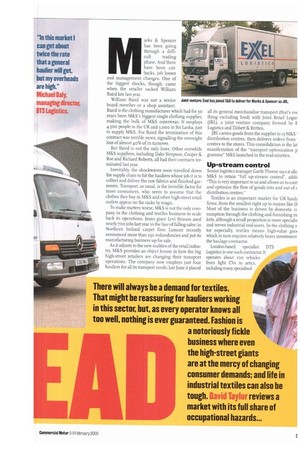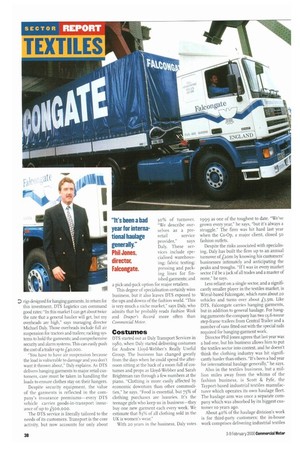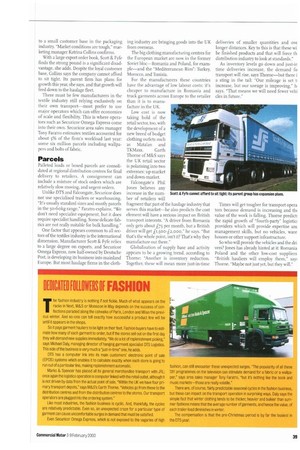11111 arks & Spencer has been going through a diffi
Page 39

Page 40

Page 41

If you've noticed an error in this article please click here to report it so we can fix it.
cult trading phase. And there have been cutbacks, job losses and management changes. One of the biggest shocks, though, came when the retailer sacked William Baird late last year.
William Baird was not a senior board member or a shop assistant. Baird is the clothing manufacturer which had for 30 years been M&S's biggest single clothing supplier, making the bulk of M&S outerwear. It employs 4.500 people in the UK and 3,000 in Sri Lanka, just to supply M&S. For Baird the termination of this contract was terrible news, signalling the overnight loss of almost 40% of its turnover.
But Baird is not the only loser. Other erstwhile M&S suppliers, including Oaks Simpson, Cooper & Roe and Richard Roberts, all had their contracts terminated last year.
Inevitably, the shocicwaves soon travelled down the supply chain to hit the hauliers whose job it is to collect and deliver the raw fabrics and finished garments. Transport, as usual, is the invisible factor for most consumers, who seem to assume that the clothes they buy in M&S and other high-street retail outlets appear on the racks by magic.
To make matters worse, M&S is not the only cornpany in the clothing and textiles business to scale back its operations. Jeans giant Levi Strauss axed nearly 7oo jobs last year in the face of falling sales; in Northern Ireland carpet firm Lamont recently announced more than 250 redundancies and put its manufacturing business up for sale.
As it adjusts to the new realities of the retail industry, M&S provides an object lesson in how the big high-street retailers are changing their transport operations. The company now employs just four hauliers for all its transport needs; last rune it placed all its general merchandise transport (that's evt thing excluding food) with Joint Retail Logist (JRL), a joint venture company formed by E Logistics and Tibbett & Britten.
JRL carries goods from the supplier to 13 M&S 1 distribution centres, then delivers orders From centres to the stores. This consolidation is the lat manifestation of the "transport optimisation p gramme" M&S launched in the mid-nineties.
Up-stream control
Senior logistics manager Garth Thorne says it ale M&S to retain "full up-stream control", addii "This is very important to us and allows us to cont and optimise the flow of goods into and out of c distribution centres."
Textiles is an important market for UK haula firms, from the smallest right up to majors like Most of the business is driven by domestic cc sumption through the clothing and furnishing m kets, although a small proportion is more specialis and serves industrial end-users. In the clothing a tor especially, textiles means high-value goo( which in turn requires relatively heavy investment the haulage contractor.
London-based specialist DTS Logistics is one such contractor. It operates about Too vehicles from light CVs to artics, including many specialised rigs designed for hanging garments. In return for this investment. DTS Logistics can command good rates: "In this market I can get about twice the rate that a general haulier will get, but my overheads are high," says managing director Michael Daly. Those overheads include full air suspension for tractors and trailers; racking systems to hold the garments; and comprehensive security and alarm systems. This can easily push the cost of a trailer up to /4o,000.
"You have to have air suspension because the load is vulnerable to damage and you don't want it thrown about." Daly explains. As DTS delivers hanging garments to major retail customers, care must be taken in handling the loads to ensure clothes stay on their hangers.
Despite security equipment, the value of the garments is reflected in the company's insurance premiums—every DTS vehicle carries goods-in-transport insurance of up to f500,000.
The DTS service is literally tailored to the needs of its customers. Transport is the core activity, but now accounts for only about 30% of turnover. "We describe ourselves as a pre retail service provider," says Daly. These services include specialised warehousing; fabric testing; pressing and packing lines for finished garments; and a pick-and-pack option for major retailers.
This degree of specialisation certainly wins business, but it also leaves DTS exposed to the ups and downs of the fashion world. "This is very much a niche market," says Daly, who admits that he probably reads Fashion Week and Draper's Record more often than Commercial Motor.
Phil Jones. director. Falcorigate.
Costumes
DTS suit ten out as Daly Transport Services in 198o, when Daly started delivering costumes for Andrew Lloyd-Webber's Really Useful Group. The business has changed greatly from the days when he could spend the afternoon sitting at the back of a room full of costumes and props as Lloyd-Webber and Sarah Brightman ran through a few numbers at the piano. "Clothing is more easily affected by economic downturn than other commodities," he says. "Food is essential, but 75% of clothing purchases are luxuries. It's the teenage girls who keep us in business—they buy one new garment each every week. We estimate that 83% of all clothing sold in the UK is women's wear."
With 2,o years in the business, Daly votes 1999 as one of the toughest to date. "We've grown every year," he says, "but it's always a struggle." The firm was hit hard last year when the Co-Op, a major client, closed 50 fashion outlets.
Despite the risks associated with specialising. Daly has built the firm up to an annual turnover of Z20111 by knowing his customers' businesses intimately and anticipating the peaks and troughs. "If I was in every market sector I'd be a jack of all trades and a master of none," he says.
Less reliant on a single sector, and a significantly smaller player in the textiles market, is Wirral-based Fakongate, which runs about 20 vehicles and turns over about f3.5m. Like DTS, Falcongate carries hanging garments, but in addition to general haulage. For hanging garments the company has two 53.6-tonne step-frame trailers from Central Trailer and a number of va ns fitted out with the special rails required for hanging-garment work.
Director Phil Jones agrees that last year was a bad one, but his business allows him to put the textiles sector into context, and he doesn't think the clothing industry was hit significantly harder than others. "It's been a bad year for international haulage generally." he says.
Also in the textiles business, but a million miles away from the whims of the fashion business, is Scott & Fyfe, the Tayport-based industrial textiles manufacturer which operates its own haulage fleet. The haulage arm was once a separate company which was absorbed by its biggest customer to years ago.
About 40% of the haulage division's work is for third-party customers; the in-house work comprises delivering industrial textiles to a small customer base in the packaging industry. "Market conditions arc tough," marketing manager Katrina Collins confirms.
With a large export order book, Scott & Fyfe finds the strong pound is a significant disadvantage, she adds. Despite the loyal customer base, Collins says the company cannot afford to sit tight. Its parent firm has plans for growth this year. she says, and that growth will feed down to the haulage fleet.
There must be few manufacturers in the textile industry still relying exclusively on their own transport—most prefer to use major operators which can offer economies of scale and flexibility. This is where operators such as Securicor Omega Express come into their own. Securicor area sales manager Tony Faratro estimates textiles accounted for about 5% of the firm's workload last year: some six million parcels including wallpapers and bolts of fabric.
Parcels
Palleted loads or boxed parcels are consolidated at regional distribution centres for final delivery to retailers. A consignment can include a mixture of stock orders which are relatively slow moving, and urgent orders.
Unlike DTS and Falcongate. Securicor does not use specialised trailers or warehousing. "It's usually standard sizes and mostly parcels in the 50-60kg range," Faratro explains. "We don't need specialist equipment, but it does require specialist handling. Some delicate fabrics are not really suitable for bulk handling."
One factor that appears common to all sectors of the textiles industry is the international dimension. Manufacturer Scott & Fyfc relies to a large degree on exports, and Securicor Omega Express, now half-owned by Deutsche Post, is developing its business into mainland Europe. But most haulage firms in the cloth
ing industry are bringing goods into the UK from overseas.
The big clothing manufacturing centres for the European market are now in the former Soviet bloc—Romania and Poland, for example—and the "Mediterranean Rim": Turkey, Morocco, and Tunisia.
For the manufacturers these countries have the advantage of low labour costs: it's cheaper to manufacture in Romania and truck garments across Europe to the retailer than it is to manufacture in the UK.
Low cost is now taking hold of the retail sector, too, with the development of a new breed of budget clothing outlets such as Matalan and TKMasoc. Garth Thorne of M&S says the UK retail sector is polarising into two extremes: up-market and down-market.
Falcongate's Phil Jones believes any increase in the number of retailers will fragment that part of the haulage industry that serves this market—he also predicts the cost element will have a serious impact on British transport interests. "A driver from Romania only gets about f75 per month, but a British driver will get fr,5oo-l2,000," he says. "But that's the whole point, isn't it? That's why they manufacture out there."
Globalisation of supply base and activity appears to be a growing trend, according to Thorne: "Another is inventory reduction. Together, these will mean more just-in-time deliveries of smaller quantities and ove longer distances. Key to this is that these wi be finished products and that will force th distribution industry to look at standards."
As inventory levels go down and just-in time deliveries increase, the demand fo transport will rise, says Thorne—but there i a sting in the tail: "Our mileage is set t increase, but our useage is improving," h, says. "That means we will need fewer vehi des in future."
Times will get tougher for transport opera tors because demand is increasing and tilt value of the work is falling. Thorne predict; the rapid growth of "fourth-party" logistic providers which will provide expertise anc management skills, but no vehicles, ware houses or other support infrastructure.
So who will provide the vehicles and the dri vers? Jones has already hinted at it: Romania Poland and the other low-cost suppliers "British hauliers will employ them," say5 Thorne. "Maybe not just yet, but they will."




































































































